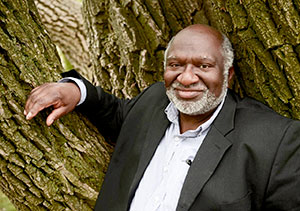 *
*
Charles Coe is a wonderful poet, jazz singer, teacher, and literary activist. He has a new collection of poetry out titled Charles Coe: New and Selected Works. I caught up with my fellow New England Poetry Club Board member, and he generously agreed to this interview.
Doug Holder: There seems to be a fair amount of food in your work. And you do a wonderful job of bringing things like tomatoes, berries, steaks with Duke Ellington, etc., to a high holy status.

Charles Coe
Charles Coe: I grew up in a very food-centered family. My father was a Mess Sergeant in the Army, stateside in Texas during the Korean War. In the sixties when my late sister Carol and I were kids he worked at the Chevy plant during the week and did all the weekend and holiday cooking. Mother cooked because it was in the job description but didn’t love it the way he did. She was more than happy to stretch out on the sofa with Reader’s Digest or watch the tube while he rattled the pots and pans. And I worked in a lot of restaurant kitchens in my younger days.
I’ve been pecking away at a family memoir called Room at the Table for the last few years, where I’m using food as a way of looking at my family’s history. So yes, you can accurately call me food-obsessed.
DH: Your work is often prose/narrative poetry. You are a well-regarded storyteller. How was this talent honed?
CC: I think the first and best piece of training for any storyteller is to read a boxcar full of books. All kinds of books. Literary fiction, mystery novels, romances, memoirs. And not just books: magazines, cereal boxes … whatever. Or listen to books if that’s your thing. It’s not mine, but if that’s how you best engage with stories go for it.
I shake my head sometimes at writers and poets – especially young ones – who don’t read much because they don’t want their “artistic voice” distracted by other writers’ work.
DH: You face age squarely on, from a late night look in the mirror, to a narrative of an over-the-hill bull that is beaten in a fight with a brash younger bull. Do you feel like that old bull sometimes, a King Lear raging at his fate, which is all our fate?
CC: We’re all in line to get on that bus but few of us know when. How often have we passed someone on the street who didn’t know they were spending their last day on Earth? Being in my early seventies I have a lot more road behind than ahead, and of course I think about that. Which is why the older I get the less willing I am to get caught up in stuff that doesn’t really matter. I’m interested in spending time with friends, smiling at supermarket cashiers, and trying to write with much honesty and craft as I can muster.
DH: You have a great love of jazz. This is often reflected in your work. Talk about this affinity for the music. Is poetry music, and music poetry?
CC: I’m a singer as well as a writer. Since I was a teenager I’ve done rock, blues, jazz, and a bit of classical, so for me the membrane between music and poetry is permeable. I’ve written a lot of songs, but most of my poetry is free verse so it’s not structured or rhymed like my song lyrics. But I try for a musical flow in my poems, more like a sax or horn solo.
DH: Why should we read your collection?
CC: A free model Winnebago Sunstar to everybody who buys my book? Or, how about this: I want people to feel the “shock of recognition” when they read my poetry and maybe think, “Yeah, I’ve experienced or observed something like that, but never would have thought about it from that perspective. Makes me think about it in a new way.
PRELUDE
Before we begin, may I ask you a question?
Would it bother you if at some point
I forgot to remember the illusion that we
are made of solid matter? That we instead
consist of atoms and electrical charges,
are ninety-nine percent empty space?
Would it bother you to look through
my suddenly spectral form and see
the backrest of this chair?
It wouldn’t be intentional, a parlor trick.
It’s just that when I think about broken children
lying in the rubble of bombed-out buildings
I sometimes find it difficult to remain tied to this world.
So if I seem to fade please don’t judge or be alarmed.
Just hold out your hand. We can touch, palm-to-palm,
to keep ourselves connected to this terrible and beautiful place,
to remind us we are made of the same stuff as the stars.
— Charles Coe















Reader Comments